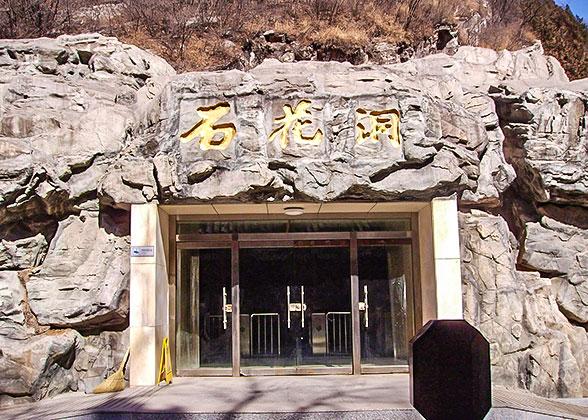Fangshan Travel Guide
Brief Intro: Fangshan, one of the four 'satellite cities' of Beijing, is a town of architecture, mineral resources, trees and fruits as well as tourism spots in suburban Beijing.
Location: southwest of Beijing
Geography: mountains, highlands and plains
Area: 2,019 sq km (about 780 sq mi)
Population: 870,000
Administrative Division:
8 Municipal Streets (Chengguan, Xinzhen, Xiangyang, Dongfeng, Yingfeng, Xingcheng, Gongchen, Xilu)
3 Municipal Districts (Liangxiang, Zhoukoudian, Liulihe),
Postal Code: 102400
Dialing Code: 010
Local Highlights: profound history and amazing scenic spots
Local Products: Mopan persimmon (a kind of fruit in the shape of millstone), white marble
Attractions
Peking Man Site at Zhoukoudian, Temple of Cloud Dwelling (Yunju Temple), Yan Capital Site of Western Zhou Dynasty (11 century BC- 711 BC), Zhangfang Ancient Plank Road, 107 ancient pagodas of many dynasties
 |
| Stone Flower Cave |
Karst Caves:
Stone Flower Cave (Shihua Cave), Yinhu Cave, Xianqi Cave, Tangren Cave, Longxian Cave, Yunshui Cave
Amusement Resorts:
Juma Paradise, Jinghui Golf, Yaoshang Countryside Golf, Haotian Amusement Park, Tianlong Hunting Center, Bofeng Green Island Ecological Garden
Rural Folk Custom Villages:
Hancunhe, Tangshang, Qidu, Xihe, Xizhuang, Baoshui, Zhangfang, Simatai, Jiudu, Banbidian, Dongganchi, Beiganchi, Sishangmin, Mujiakou, Shangshibu, Changyang Grape Orchard, Dashiwo Chinese Dates Orchard, Liulihe Pear Orchard
Scenic Areas:
Ten Ferries (Shidu), Mt. Shangfang National Forest Park, Mt. Holy Lotus (Mt. Shenglian), Qinglong Lake
Mt. Shangfang National Forest Park, 65 kilometers (about 40.4 mi) from the city center, is an ideal destination for amusement and traveling. People say scenery here is as beautiful as that in Suzhou and Hangzhou. There are 9 caves, 12 peaks and 72 small temples presenting a distinctively natural feature together with the elegant mountain, very tall trees as well as nice flowers. A large number of trees in the park can help tourists breathe fresh air and experience the harmony with nature. Besides, the Karst landform of different shapes here shows various lifelike landscapes. This park is also a famous Buddhist mountain with 72 temples and temple sites. Therefore, arriving at Mt. Shangfang National Forest Park, you seem to appreciate a vivid Buddhist historical picture.
Mt. Holy Lotus is considered as the first strange mountain of Beijing due to the holy water and holy rice as well as the miracle geological landscape. There are 28 heavenly ladders, temples in the south and north, lying Buddha and others. Flat Peach Palace is the representative buildings as a famous Taoist temple. In the west of Flat Peach Palace, a vertical cliff as a half peak and four small peaks on the both sides form a Lotus Holy Seat (Shenglian Baozuo). It is because of the special view that the mountain is named Mt. Holy Lotus. And on the waist of the cliff, the 4-meter (about 13 ft) statue of a goddess is well preserved.
Qinglong Lake, originally Chongqing reservoir, was developed to a resort in 1995. Covering 4.94 square kilometers (about 1.9 sq mi), it has very broad waters. Being only 37 km (about 23 mi) from Tiananmen Square, the scenic area is a good choice for relaxation. There are limpid lake, picturesque scenery and attractive beach. Here you can experience not only water motor and dragon boat, but also relax yourself by fishing at the lake.
Useful Numbers
Consumer Complaint: 010-69367937